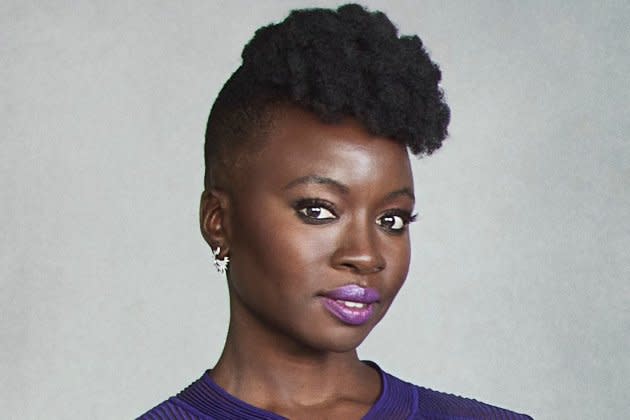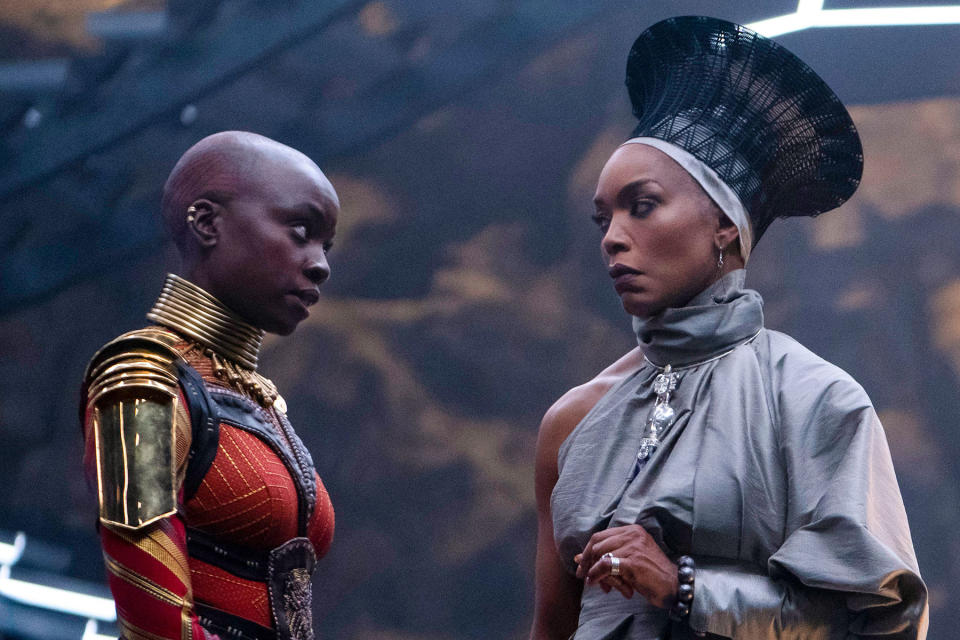‘Black Panther’ Star Danai Gurira’s Fight Against Stereotyping
- Oops!Something went wrong.Please try again later.
- Oops!Something went wrong.Please try again later.

She was a whore. She had to be. Her skirt was so short. So she deserved it. When I was nine years old, a student at the University of Zimbabwe, where both my parents were employed, was stripped of her clothes by a pack of men because they decreed her attire “inappropriate,” and her character clearly of ill repute. She “deserved” it. And most agreed. I felt a fire in my belly about how unjust this seemed. Not fully equipped with the language to speak against this, I tried nonetheless. At the University of Zimbabwe Church, many of us kids being the children of academics, I argued with an entire group of them — me versus at least nine or 10 others — ranting about how the men shouldn’t have done that to her no matter what she wore. But finally, one girl cut through my passionate diatribe with a sentence of condemnation, chilling in her conviction: “But Danai, her skirt was really short.”
That was the day I learned the power of stereotypes. How a generalized belief system can result in the acceptance of injustice. How it can damage people’s lives. When I was growing up, it was all about a woman’s virtue, and how she dressed or how loud she spoke defined how society was willing to treat her. I noted all types of stereotypes around exactly what I was, what I am: Black and female. The limitations expected of us in aptitude and leadership and beauty. And not to mention how unpopular it can be for a Black woman to express her passion through her assertions, her words, her ability to not back down. The difficulty for me is that is exactly how I was built. I was that girl who wouldn’t hesitate to express her thoughts, or believe herself qualified to take the helm, or wear a short skirt if she thought it was cute.
More from Rolling Stone
'Black Panther 2' Actor Tenoch Huerta Denies 'Sexual Predator' Allegations Made by Musician
How Producers and Composers Found a Balance Between Tradition and Afrofuturism on 'Black Panther'
That didn’t change as I grew up; it just intensified. In the U.S., I was astounded by the stereotypes around Africa and Africans, and particularly women. How rarely any narrative came from her perspective, and whenever stories were told about Africa and given a platform, they were not only not written by an African, they usually came from a “white savior” perspective. And after grad school, I, as a young African newly trained actor, was constantly approached to play these thankless “noble savage” tropes. Even narratives for African American roles bore a similar weight: the sassy friend, the characterless police boss. It was embodied in the idea that Black women did not have too much of a story to tell, and no one was interested anyway. But something in my gut, the same thing that caused me to speak out against those condemning the victim at the University of Zimbabwe, told me that was wrong. That the world would hear Black women speak if we got half the chance and the platform. That’s what led me to start writing plays, and bring the first Black African female protagonists to the American stage. I had to shatter the stereotype and ignore the naysayers who told me no one would ever produce these works.
Shattering stereotypes takes work. Sometimes it can be so much easier to just go along with them, let them slide. But who do you become? For me, how I found and continue to find my way to shatter them often involves the word “no.” I don’t act in a lot of roles because too often the roles for Black women fall into a stereotypical sphere, and I am actively trying to shatter that sphere. I would rather stay in my house, crafting the next narrative I have inside of me that defies stereotypes than be out in the world perpetuating them.
Shattering stereotypes also requires a willingness to function in isolation. I was certain that no one would produce The Convert, a play I wrote about a young Zimbabwean girl in 1896, but I knew I had to counter the one-sided, white male perspective about how the history around colonization went down. It was 2010. I could have been acting as a sassy best friend; instead, I sat, broke on my couch (actually, it was my roommate’s couch), and researched as I wrote this story I was unsure anyone would let me tell. But I was wrong. The play was widely produced, in England as well, where it is now on the syllabus for high school students studying the dramatic arts. The first narrative of its kind about an African woman, by an African woman, to make it into their schooling system.
Shattering stereotypes requires defiance and a willingness to live in discomfort. It isn’t always easy to stand up for what you know is right. We hear so many stories about men who don’t speak up when they hear other men speak in degrading ways about women, but how does anything change if we leave damaging perspectives unchallenged? We have to defy what has been accepted as a norm, and have the courage to do so. Without that, we lose our ability to reach our potential and we deny others the ability to reach theirs. The courage it takes to stand up for what you know is right may not feel great at the time, but I have seen so many benefits just in my lifetime. Even by turning down stereotypical roles, I was available for the original stereotype-defying roles that have shaped my work, from Adenike in the tiny indie Mother of George that Ryan Coogler saw and led him to cast me in the role of Okoye, the general of the Dora Milaje in what was to become Black Panther.

We are now in a time where stereotypes are compounded by the information age. With all its clear benefits, the information age is also making us less interested in depth of knowledge and understanding. It’s making us lazy. And leaning on stereotypes to navigate our way through the world is exactly that: it’s lazy.
A true exchange to garner understanding is not 280 characters or less. It can’t fit in a Reel. I have to make sure I am not relying on a snapshot to understand someone different from myself, so I don’t become a bystander in the presence of the sting of stereotyping — or even worse, a perpetuator. Unstereotyping, the term used to describe the goal of the Say Nothing, Change Nothing campaign convened by UN Women, is the act of being an Upstander — refusing to ever stand in the face of stereotyping and do nothing. I guess I was an Upstander that day all those years ago. But how quickly would I be one today? Data shows us that 73 percent of people witness harmful stereotyping on a daily basis, and less than a third of people are willing to stand up to said stereotyping when they witness it. That’s unfortunate, and deeply concerning. Unstereotyping brings us to a new place in ourselves and our engagement with the world and it nurtures the thing that our information age has eroded: curiosity.
Curiosity is the antidote to stereotyping. It illicits an opening of the mind and a willingness to garner new knowledge. Now, there are respectful and disrespectful ways to engage your curiosity. For instance, and for clarity, white people, please do not go sticking your hands in Black women’s hair in the name of curiosity. I beg, as the Nigerians say, I beg. Curiosity must be tempered with respect. But seeking a deeper understanding is never a problematic pursuit. Respect comes from empathy. It is difficult to stereotype and practice empathy simultaneously.
We cannot be both prone to stereotypes and prone to curiosity simultaneously. Now, there are times stereotypes can guise themselves as curiosity. For example, years ago, I was questioned by a now retired TV host of his eponymous show about the creation of the premise of my Broadway play, Eclipsed. He was, shockingly, struggling with the fact that I had created it. As successful as it was, he was seeking to find other players in its inception. Something I am sure he would not have struggled with had it been one of my fellow white male award-winning playwright counterparts. “Who came up with this?” he probed. My cheeks flushed with shock, hurt. I mean, really? But I just chuckled as I assured him it was me. I was the creator. Who else? He argued, “Oh, I don’t know, it may have been a group effort.” Diminishing me as a creator, as a playwright, flippantly. This encounter reminds me of how stereotypes can guise themselves as curiosity. But it is not. He needed his stereotype that this young Black African woman before him could not have possibly achieved what she had achieved. And he was seeking its reinforcement.
We cannot fix this pervasive plague in society before we fix it in ourselves. Have we done our own stereotyping audit? What simplistic, harmful ideas about others are we holding on to? What can we learn about how to counter wrongful norms from our own past experiences? And how do you use your power in a way that makes you a part of the cure, not the problem?
Stereotypes disconnect us from each other and harm the lives of many. Curiosity guides us to a place of reconnection, empathy, and resonant experiences with those we previously knew little about or never even imagined existed.
Let’s popularize unstereotyping. Let’s popularize curiosity. As the Say Nothing, Change Nothing campaign seeks to do, let’s challenge ourselves to curiously diminish stereotyping in ourselves and then step out and challenge it in others. The road may be isolating at first, you may be the first in your respective space to change the tone, but there is ultimately no regret in being the first. The regret will always be in doing nothing at all. Or perpetuating that which harms.
I think back to that nine-year-old girl defending a woman she didn’t know. Where she got that courage from must be credited to the women who brought me into this world. My mother, Josephine Chiza Gurira, has always had a fire in her belly and a passion for injustice around women and girls. Her mother, Miriam Sherekete Mutambara Chiza, the daughter of a powerful chief during turbulent colonial times, chose to defy several norms — including what level of education she was expected to achieve, who she was expected to marry, and as white colonial men beat my grandfather in then Rhodesia (now Zimbabwe) in the Seventies, she stood between him and them, asserting herself as a person who would not stand for their abuse as the daughter of a true leader of her country (my great-grandfather Chief Mutambara). They backed away, surprised that she could even speak English. Defiance, courage may be in my DNA, but I have to recommit to it every day.
It requires advocacy — not just for myself, but for others. I have to remember that nine-year-old girl inside of me and ask her what she would do. My hope and my conviction is that there is a nine-year-old hero inside of us all. We just have to check into their truth, and have the courage to do more of what they would. That’s why being a part of the Unstereotype Alliance’s Say Nothing, Change Nothing campaign is so important to me. It’s what that nine-year-old girl would certainly tell me to do.
Best of Rolling Stone

